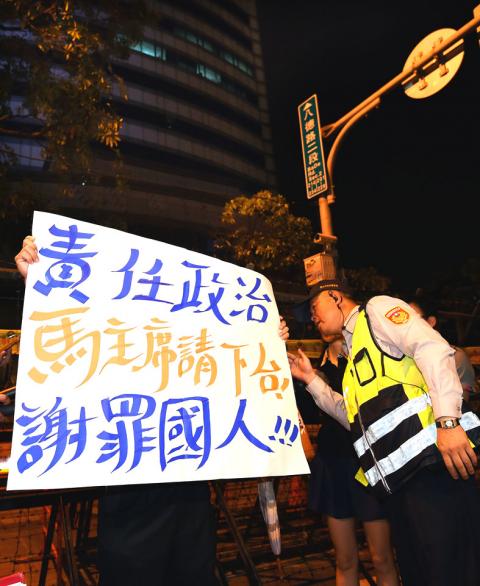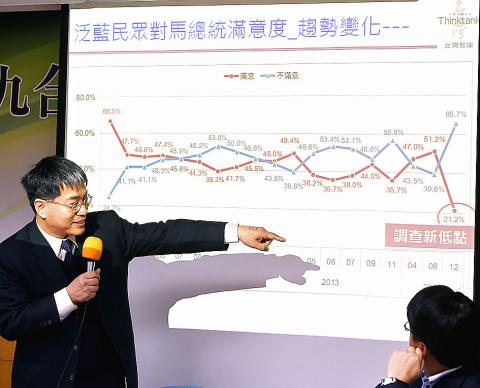One of the main reasons behind the Chinese Nationalist Party’s (KMT) disastrous defeat in the nine-in-one elections on Saturday last week is the public’s strong disapproval of President Ma Ying-jeou (馬英九) and Premier Jiang Yi-huah’s (江宜樺) performances, particularly among the younger generation, a Taiwan Thinktank survey said yesterday.
The telephone-based poll was conducted among 1,069 Taiwanese older than 20 on Sunday and Monday to gauge voting behavior in the nation’s largest-ever local elections.
The survey found that more than 74 percent of respondents are dissatisfied with Ma’s performance as president, up from 66.8 percent recorded in a similar poll conducted by the think tank in June. It also found that Ma’s approval rating sank to just 9.7 percent from 21.7 percent in June, with just 5.7 percent of people aged between 20 and 29 saying they are satisfied with Ma’s work over the past six years.

Photo: Chien Jung-fong, Taipei Times
Jiang received nearly the same approval rating from respondents in that age group — 9.8 percent — far lower than the average figure of 14.2 percent given by all those surveyed.
David Huang (黃偉峰), an assistant research fellow at Academia Sinica’s Institute of European and American Studies, said youth turnout had been about 60 percent in previous elections, but increased to 74 percent in Saturday’s polls.
“The increase is particularly meaningful when compared with the overall voter turnout of 67.5 percent. Who those extra 14 percent of young people voted for and whether they decided to participate in the election as a form of protest against the Ma administration are questions worth exploring,” Huang told a press conference held to release the poll results in Taipei.

Photo: Fang Pin-chao, Taipei Times
Huang said that while about 64 percent of the survey participants said they made up their minds about which candidate to back based on information from television news shows, the percentage of people consulting content on news and social networking sites increased.
Taiwan Thinktank deputy chief executive Lai I-chung (賴怡忠) said the elections were apparently a vote of no confidence in the Ma administration, citing the 25.1 percent of respondents who said their discontent with the central government was an important factor in their decision at polling stations.
“It is also worth noting that nearly 53 percent of those polled attribute the KMT’s defeat in the local elections to the public’s disapproval of [what are perceived as] the Ma administration’s China-leaning and corporation-centered policies, with about 51 percent saying it would take more than Ma stepping down as KMT chairman for the party to regain public support,” Lai said.
Lai said the election results also signify the end of the KMT’s traditional campaigning methods, as evidenced by the 63.5 percent of respondents who said they found ineffective the party’s threat that a victory by independent Taipei mayoral candidate Ko Wen-je (柯文哲) would destroy the Republic of China.
Nearly 64 percent of respondents said the public frenzy over Ko has made them more willing to consider voting for independent candidates in the future, the survey showed. Sixty-nine percent said the election results will be conducive to Taiwan’s democracy, while 46.4 percent think they will benefit the nation’s economy.

DAREDEVIL: Honnold said it had always been a dream of his to climb Taipei 101, while a Netflix producer said the skyscraper was ‘a real icon of this country’ US climber Alex Honnold yesterday took on Taiwan’s tallest building, becoming the first person to scale Taipei 101 without a rope, harness or safety net. Hundreds of spectators gathered at the base of the 101-story skyscraper to watch Honnold, 40, embark on his daredevil feat, which was also broadcast live on Netflix. Dressed in a red T-shirt and yellow custom-made climbing shoes, Honnold swiftly moved up the southeast face of the glass and steel building. At one point, he stepped onto a platform midway up to wave down at fans and onlookers who were taking photos. People watching from inside

A Vietnamese migrant worker yesterday won NT$12 million (US$379,627) on a Lunar New Year scratch card in Kaohsiung as part of Taiwan Lottery Co’s (台灣彩券) “NT$12 Million Grand Fortune” (1200萬大吉利) game. The man was the first top-prize winner of the new game launched on Jan. 6 to mark the Lunar New Year. Three Vietnamese migrant workers visited a Taiwan Lottery shop on Xinyue Street in Kaohsiung’s Gangshan District (崗山), a store representative said. The player bought multiple tickets and, after winning nothing, held the final lottery ticket in one hand and rubbed the store’s statue of the Maitreya Buddha’s belly with the other,

‘COMMITTED TO DETERRENCE’: Washington would stand by its allies, but it can only help as much as countries help themselves, Raymond Greene said The US is committed to deterrence in the first island chain, but it should not bear the burden alone, as “freedom is not free,” American Institute in Taiwan Director Raymond Greene said in a speech at the Institute for National Defense and Security Research’s “Strengthening Resilience: Defense as the Engine of Development” seminar in Taipei yesterday. In the speech, titled “Investing Together and a Secure and Prosperous Future,” Greene highlighted the contributions of US President Donald Trump’s administration to Taiwan’s defense efforts, including the establishment of supply chains for drones and autonomous systems, offers of security assistance and the expansion of

STREAMLINED: The dedicated funding would allow the US to transfer equipment to Taiwan when needed and order upgraded replacements for stockpiles, a source said The US House of Representatives on Thursday passed a defense appropriations bill totaling US$838.7 billion, of which US$1 billion is to be allocated to reinforcing security cooperation with Taiwan and US$150 million to replace defense articles provided to the nation. These are part of the Consolidated Appropriation Act, which the US House yesterday passed with 341 votes in favor and 88 against. The act must be passed by the US Senate before Friday next week to avoid another government shutdown. The US House Committee on Appropriations on Monday unveiled the act, saying that it allocates US$1 billion for the Taiwan Security Cooperation Initiative